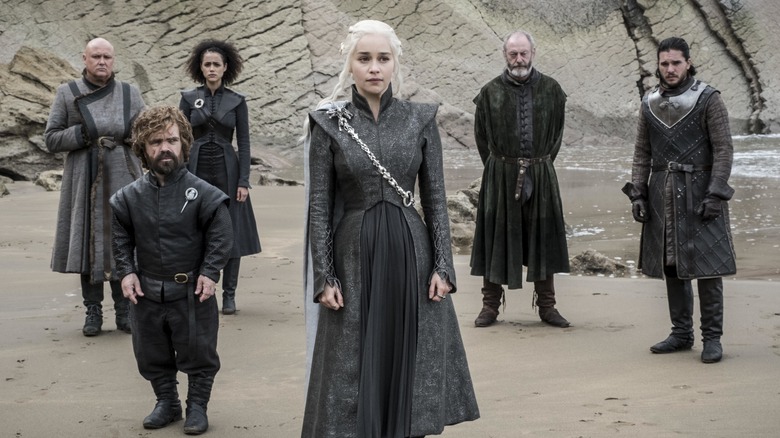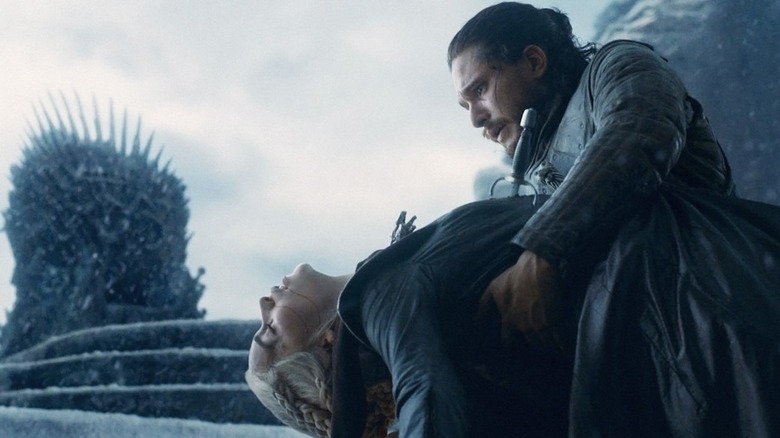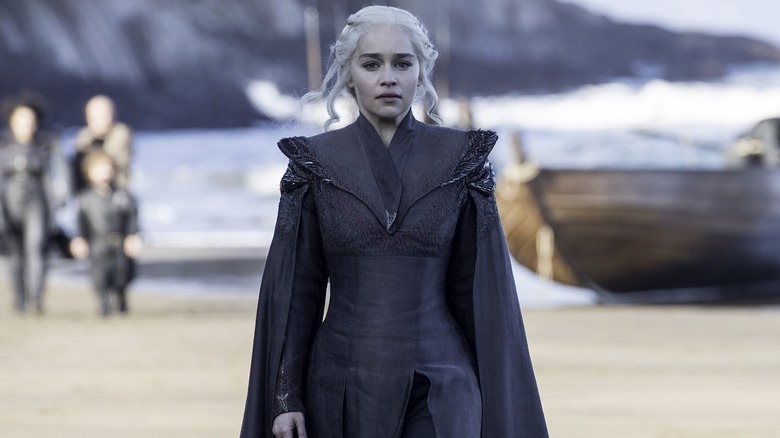Out Of Every Death In Game Of Thrones, This One Stands Above The Rest
Of the all the incalculable carnage and innumerable deaths HBO's "Game of Thrones" bestowed upon its devoted (if ultimately infuriated) viewership, the death that hit fans the hardest came in its controversial series finale. And nearly three years later, it still has audiences arguing over its merit. The award-winning adaption of George R.R. Martin's saga "A Song of Ice and Fire" premiered in 2011, and according to IMDb, it remains the most watched show of the past four decades.
Over the course of its eight seasons, the unapologetically decadent show gave us more memorable deaths than all five "Final Destination" movies put together. Some of these deaths (Ser Jorah Mormont's comes to mind) had audiences in abject mourning, while others elicited sports-fan levels of elation and vindication (cough cough, King Joffrey, cough cough.) And yet, among all these deaths (and presumed deaths that were not deaths), there's one in particular that will forever reign supreme — though maybe not for all the reasons the writers intended.
Missandei of Naath's role in Game of Thrones' most devastating death
We're talking, of course, about the absolutely gutting death of one of the show's most beloved protagonists: the Mother of Dragons and The Breaker of Chains herself, Daenerys "Stormborn" Targaryen (Emilia Clarke). After watching the wide-eyed and idealistic heir to the Iron Throne evolve over the course of eight seasons into the fierce warrior and justice-hungry leader she ultimately became, fans were downright infuriated both by her drastic devolution in the final few episodes, and by the untimely death to which it led.
Daenerys' demise at the hands of her lover — and nephew, and ostensible true heir to the Iron Throne — Jon Snow (Kit Harington), was the straw that broke the camel's back when it came to fans' patience with the final season. It's important to note, however, that another proverbial straw had been broken earlier in the season, and the snap it created reverberated throughout the culmination of the epic narrative.
In Season 8, episode 4 ("The Last of the Starks") Daenerys' Hand of the Queen, Tyrion Lannister (Peter Dinklage), attempts to talk his tyrant sister Cersei into surrendering her crown in order to avoid the loss of so many innocent lives in King's Landing. To the surprise of literally no one, Cersei (Lena Headey) rejects his proposal for a peaceful transition of power, and — in an effort to illustrate just how determined she is to fight to the death — cruelly beheads Daenerys' long-time best friend and confidant, Missandei of Naath (Nathalie Emmanuel). It's an injustice that sends Daenerys — who witnesses the bloody act — over the edge, and signals (or, was meant to signal) the finality of her turn from liberator to dictator.
Was Daenerys' death inevitable?
One of the things that made Daenerys' death all the more gut-wrenching for fans was the Dragon Queen's return to the innocent and idealistic freedom fighter she was before the realities of war and the corrosive nature of power turned her into a despot. For a few brief moments, audiences were reminded of the Daenerys they'd come to know, love, and champion for over seven years. Unfortunately, in the end her desire to sit on the throne because she fully believes she knows "what is good" and that others shouldn't "get to choose" is no different from the villainous Cersei's approach.
With Daenerys' death, the show's writers seem to want to drive home two points at once. The first is that the line between self-righteous savior and evil tyrant doesn't exist — at least, not when the results of their actions are indistinguishable from one another. The second is an old standby: that absolute power corrupts absolutely, and inevitably. To be fair, audiences may not have taken issue with any of this, had Daenerys degeneration not been so rushed. It wasn't, some argued, the death itself that incited such anger from fans, but the fact that the events leading up to the end of "Game of Thrones" weren't enough to warrant such a dark turn. Still, others had a different take entirely. Insider's Callie Ahlgrim concluded that "Dany's downfall, topped off with a hint of redemption, is the perfect example of why the show gripped our attention in the first place."
What does this mean for future Game of Thrones installments?
It's been over three years since fans watched Jon Snow kill his queen, then hold her limp body in his lap in a pose undeniably meant to mimic The Pietà. While many are still fuming over Daenerys having been done so wrong, still others are attempting to reinterpret the controversial finale with fresh eyes. But whether you agree with the show sacrificing Dany for the sake of allegory and thematic resonance — or would still be more than willing to sign the petition for a season "re-do" — it's hard to argue that any other single death in the series had such a lasting impact on its legacy.
Speaking of that legacy, one wonders what the adverse reaction to the "Game of Thrones" series finale will mean for its upcoming spin-off, "House of the Dragon," and the various other "Game of Thrones" projects rumored to be in the works. While it could put future shows in the precarious position of having to awkwardly appease a previously dejected fan-base, one thing's for certain: When it comes to Westeros, "if you film it, they will watch."



